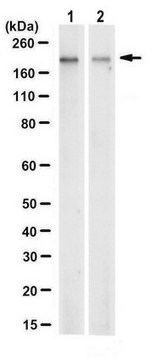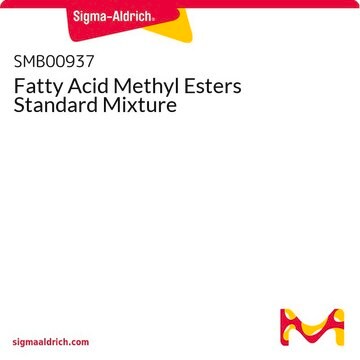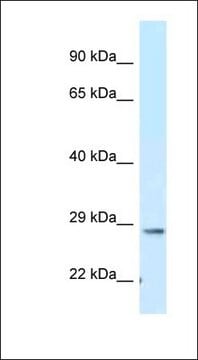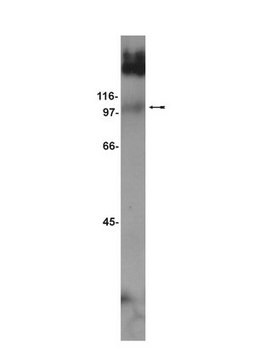MAB5204
Anti-Agrin Antibody
Chemicon®, from mouse
Synonym(s):
Anti-AGRIN, Anti-CMSPPD
Sign Into View Organizational & Contract Pricing
All Photos(1)
About This Item
UNSPSC Code:
12352203
eCl@ss:
32160702
NACRES:
NA.41
Recommended Products
biological source
mouse
Quality Level
antibody form
purified immunoglobulin
antibody product type
primary antibodies
clone
monoclonal
species reactivity
mouse, rat
manufacturer/tradename
Chemicon®
technique(s)
immunocytochemistry: suitable
western blot: suitable
isotype
IgG1
NCBI accession no.
UniProt accession no.
shipped in
dry ice
target post-translational modification
unmodified
Gene Information
human ... AGRN(375790)
Specificity
MAB5204 recognizes rat and mouse agrin. The epitope has been mapped near the splicing site Z. Binding of this antibody to agrin causes marked reduction in nAChR clusters.
Immunogen
Recombinant rat agrin (C-terminal construct)
Application
Anti-Agrin Antibody is an antibody against Agrin for use in WB & IC.
Immunocytochemistry: 10 μg/mL
Optimal working dilutions must be determined by the end user.
Optimal working dilutions must be determined by the end user.
Research Category
Neuroscience
Neuroscience
Research Sub Category
Growth Cones & Axon Guidance
Synapse & Synaptic Biology
Growth Cones & Axon Guidance
Synapse & Synaptic Biology
Physical form
Format: Purified
Purified immunoglobulin. Liquid in PBS containing 50% glycerol and 0.09% sodium azide.
Storage and Stability
Maintain lyophilized at material -20°C or below for up to 12 months. After reconstitution maintain at -20°C to -70°C in undiluted aliquots for up to 6 months. Avoid repeated freeze/thaw cycles.
Other Notes
Concentration: Please refer to the Certificate of Analysis for the lot-specific concentration.
Legal Information
CHEMICON is a registered trademark of Merck KGaA, Darmstadt, Germany
Disclaimer
Unless otherwise stated in our catalog or other company documentation accompanying the product(s), our products are intended for research use only and are not to be used for any other purpose, which includes but is not limited to, unauthorized commercial uses, in vitro diagnostic uses, ex vivo or in vivo therapeutic uses or any type of consumption or application to humans or animals.
Not finding the right product?
Try our Product Selector Tool.
Storage Class
10 - Combustible liquids
wgk_germany
WGK 2
Certificates of Analysis (COA)
Search for Certificates of Analysis (COA) by entering the products Lot/Batch Number. Lot and Batch Numbers can be found on a product’s label following the words ‘Lot’ or ‘Batch’.
Already Own This Product?
Find documentation for the products that you have recently purchased in the Document Library.
Nandor Nagy et al.
Development (Cambridge, England), 145(9) (2018-04-22)
The enteric nervous system (ENS) arises from neural crest cells that migrate, proliferate, and differentiate into enteric neurons and glia within the intestinal wall. Many extracellular matrix (ECM) components are present in the embryonic gut, but their role in regulating
The COOH-terminal domain of agrin signals via a synaptic receptor in central nervous system neurons.
Hoover, CL; Hilgenberg, LG; Smith, MA
The Journal of cell biology null
Paul J Thomas et al.
The American journal of pathology, 186(9), 2429-2448 (2016-08-27)
Overexpression of B4GALNT2 (previously GALGT2) inhibits the development of muscle pathology in mouse models of Duchenne muscular dystrophy, congenital muscular dystrophy 1A, and limb girdle muscular dystrophy 2D. In these models, muscle GALGT2 overexpression induces the glycosylation of α dystroglycan
Silvia Scaricamazza et al.
British journal of pharmacology, 179(8), 1732-1752 (2021-11-17)
Amyotrophic lateral sclerosis (ALS), a neurodegenerative disease characterized by the degeneration of upper and lower motor neurons, progressive wasting and paralysis of voluntary muscles and is currently incurable. Although considered to be a pure motor neuron disease, increasing evidence indicates
Jessica L Mueller et al.
Stem cells translational medicine, 13(5), 490-504 (2024-02-22)
Regenerative cell therapy to replenish the missing neurons and glia in the aganglionic segment of Hirschsprung disease represents a promising treatment option. However, the success of cell therapies for this condition are hindered by poor migration of the transplanted cells.
Our team of scientists has experience in all areas of research including Life Science, Material Science, Chemical Synthesis, Chromatography, Analytical and many others.
Contact Technical Service








